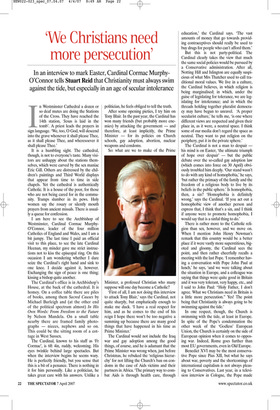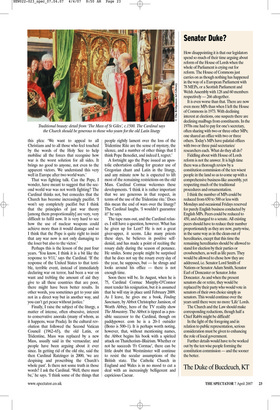‘We Christians need more persecution’
In an interview to mark Easter, Cardinal Cormac MurphyO’Connor tells Stuart Reid that Christianity must always swim against the tide, but especially in an age of secular intolerance In Westminster Cathedral a dozen or so deaf mutes are doing the Stations of the Cross. They have reached the 14th station, ‘Jesus is laid in the tomb’. A priest leads the prayers in sign language. ‘We, too, O God, will descend into the grave whenever it shall please Thee, as it shall please Thee, and wheresoever it shall please Thee.’ It is a humbling sight. The cathedral, though, is not to everyone’s taste. Many visitors are unhappy about the stations themselves, which were carved by the sex maniac Eric Gill. Others are distressed by the children’s paintings and Third World displays that appear from time to time in side chapels. Yet the cathedral is authentically Catholic. It is a house of the poor, for those who are not being cared for in the community. Tramps slumber in its pews. Holy women say the rosary or silently mouth prayers from ancient missals. There is usually a queue for confession.
I am here to see the Archbishop of Westminster, Cardinal Cormac MurphyO’Connor, leader of the four million Catholics of England and Wales, and I am a bit jumpy. The last time I paid an official visit to this place, to see the late Cardinal Heenan, my minder gave me strict instructions not to kiss the episcopal ring. On this occasion I am wondering whether I dare seize the Cardinal’s right hand and sink to one knee. I decide against it, however. Exchanging the sign of peace is one thing; kissing a bishop quite another.
The Cardinal’s office is in Archbishop’s House, at the back of the cathedral. It is homey. On a coffee table there are piles of books, among them Sacred Causes by Michael Burleigh and (at the other end of the political spectrum almost) In His Own Words: From Freedom to the Future by Nelson Mandela. On a small table nearby there are framed family photographs — nieces, nephews and so on. This could be the sitting room of a cottage in West Sussex.
The Cardinal, known to his staff as ‘Fr Cormac’, is 6ft 4in, ruddy, welcoming. His eyes twinkle behind large spectacles. But when the interview begins he seems wary. He is perfectly friendly, but you sense that this is a bit of a penance. There is nothing in it for him personally. Like a politician, he takes great care with his answers. Unlike a politician, he feels obliged to tell the truth.
After some opening pieties, I try him on Tony Blair. In the past year, the Cardinal has won many friends (but probably more enemies) by attacking the government — and therefore, at least implicitly, the Prime Minister — for its policies on Church schools, gay adoption, abortion, nuclear weapons and condoms.
So: what are we to make of the Prime Minister, a professed Christian who many suppose will one day become a Catholic?
‘First of all, I am not doing this interview to attack Tony Blair,’ says the Cardinal, not quite sharply, but emphatically enough to make me duck. ‘I have a real respect for him, and as he comes to the end of his reign I hope there won’t be too negative a summing up because there are many good things that have happened in his time as Prime Minister.’ The Cardinal would not include the Iraq war and gay adoption among the good things, of course, and he is adamant that the Prime Minister was wrong when, just before Christmas, he rebuked the ‘religious hierarchy’ for not lifting the Church’s ban on condoms in the case of Aids victims and their partners in Africa. ‘The primary way to combat Aids is through health care, through education,’ the Cardinal says. ‘The vast amounts of money that go towards providing contraceptives should really be used to buy drugs for people who can’t afford them.’ But this is not party-political. The Cardinal clearly takes the view that much the same social policies would be pursued by a Conservative administration. After all, Notting Hill and Islington are equally suspicious of what Mrs Thatcher used to call traditional moral values. We live in a culture, the Cardinal believes, in which religion is being marginalised; in which, under the guise of legislating for tolerance, we are legislating for intolerance; and in which the threads holding together pluralist democracy may have begun to unravel. ‘A proper secularist culture,’ he tells me, ‘is one where different views are respected and given their place in, as it were, a neutral space. I think some of our media don’t regard the space as neutral. They want to put religion on the periphery, put it in the private sphere.’ The Cardinal is not a man to despair his mind is on Easter, ‘the ultimate triumph of hope over despair’ — but the public debate over the so-called gay adoption law (which comes into force on 30 April) obviously troubled him deeply. ‘Our stand wasn’t to do with any kind of homophobia,’ he says, ‘but rather the primacy of the family and the freedom of a religious body to live by its beliefs in the public sphere.’ Is homophobia, then, a sin? ‘Homophobia is definitely wrong,’ says the Cardinal. ‘If you act out a homophobic view of another person and express that, I think that’s a sin, and I think if anyone were to promote homophobia, I would say that is a sinful thing to do.’ There is rather more to the Catholic religion than sex, however, and we move on. When I mention John Henry Newman’s remark that this country would be a better place if it were vastly more superstitious, bigoted and gloomy, the Cardinal sees the point, and then rather cheerfully recalls a meeting with the last Pope. ‘I remember having a conversation with Pope John Paul at lunch,’ he says, ‘and we were talking about the situation in Europe, and a colleague was saying that things were quite good in Britain and it was very tolerant, very happy, etc., and I said to John Paul: “Holy Father, I don’t agree. What we Christians need in Britain is a little more persecution.” Yes! The point being that Christianity is always going to be swimming against the tide.’ In one respect, though, the Church is swimming with the tide, at least in Europe. In spite of the Pope’s condemnation the other week of the ‘Godless’ European Union, the Church is certainly on the side of European opinion when it comes to opposing war. Indeed, Rome goes further than most EU governments, even in Old Europe.
Benedict XVI may be the most conservative Pope since Pius XII, but what he says about war, poverty and the shortcomings of international capitalism is not always pleasing to Conservatives. Last year, in a television interview in Cologne, the Pope made this plea: ‘We want to appeal to all Christians and to all those who feel touched by the words of the Holy See to help mobilise all the forces that recognise how war is the worst solution for all sides. It brings no good to anyone, not even to the apparent victors. We understand this very well in Europe after two world wars.’ That was fighting talk. Can the Pope, I wonder, have meant to suggest that the second world war was not worth fighting? The Cardinal thinks not, but concedes that the Church has become increasingly pacifist. ‘I won’t say completely pacifist but I think that the principles of just war theory [among them proportionality] are very, very difficult to fulfil now. It is very hard to see how the use of nuclear weapons could achieve more than it would damage and so I think that the Pope is quite right to insist that any war now is not only damaging to the loser but also to the victor.’ Perhaps this is the lesson of the past four years. ‘You know, I think it is a bit like the response to 9/11,’ says the Cardinal. ‘If the response of the United States to that terrible, terrible event, instead of immediately declaring war on terror, had been a war on want and trebling the amount of aid they give to all these countries that are poor, there might have been better results. In other words, you sometimes get to your aim not in a direct way but in another way, and you can’t get peace without justice.’ Finally, I raise the subject of the liturgy, a matter of intense, often obsessive, interest to conservative anoraks (many of whom, as it happens, wear Prada). In the cultural revolution that followed the Second Vatican Council (1962–65), the old Latin, or Tridentine, Mass was replaced by a new Mass, usually said in the vernacular; and people have been arguing about it ever since. In getting rid of the old rite, said the then Cardinal Ratzinger in 2000, ‘we are despising and proscribing the Church’s whole past’. Is there not some truth in those words? I ask the Cardinal. ‘Well, there must be,’ he says. ‘I think some of the things that people rightly lament over the loss of the Tridentine Rite are the sense of mystery, the silence, and a number of other things that I think Pope Benedict, and indeed I, regret.’ A fortnight ago the Pope issued an apostolic exhortation calling for greater use of Gregorian chant and Latin in the liturgy, and any minute now he is expected to lift most of the remaining restrictions on the old Mass. Cardinal Cormac welcomes these developments. ‘I think it is rather important that we are generous in that respect, in terms of the use of the Tridentine rite.’ Does this mean the end of wars over the liturgy? The Cardinal laughs. ‘I wouldn’t guarantee it!’ he says.
The tape runs out, and the Cardinal relaxes. I still have a question, however. What has he given up for Lent? He is not a great giver-upper, it seems. Like many priests these days, he believes in positive selfdenial, and has made a point of reciting the rosary daily during the season of penance. He smiles. Some people might be surprised that he does not say the rosary every day of the year, he supposes, but — he shrugs and looks around his office — there is not enough time.
Soon there will be. In August, when he is 75, Cardinal Cormac Murphy-O’Connor must tender his resignation, but it is assumed that he will stay in place until February 2009. As I leave, he gives me a book, Finding Sanctuary, by Abbot Christopher Jamison, of Worth Abbey, hero of the TV reality show The Monastery. The Abbot is tipped as a possible successor to the Cardinal, though on paddypower. com he is a 20–1 outsider (Bono is 500–1). It is perhaps worth noting, however, that, without mentioning names, the Abbot begins his book with a spirited attack on Thatcherism–Blairism. Whether or not he succeeds ‘Fr Cormac’, there can be little doubt that Westminster will continue to resist the secular assumptions of the British state. The Catholic Church in England and Wales is in no mood to cut a deal with an increasingly belligerent and capricious Caesar.



































































 Previous page
Previous page